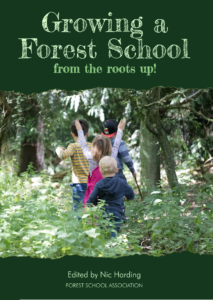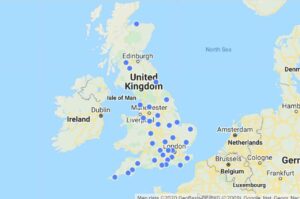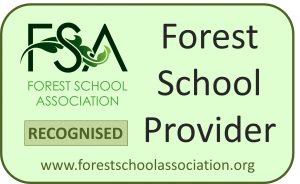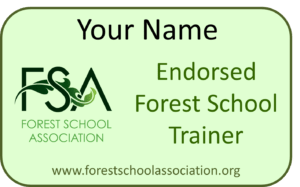Forest School Forward
By Dr Sara Knight
Horizons Magazine has published two articles by Jon Cree and Mel McCree (1) in the past that cover the origins of Forest School in the UK and its development up to the forming of the Forest School Association (FSA) in 2012. In 2022 I was asked to follow this up by pulling together a display covering the years 2012 to 2022 in time for the 2022 Forest School Association National Conference. Being aware of the traps lying in wait for anyone who thinks that they know the whole story, I chose to leave spaces in the display and invite attendees to add their thoughts and memories to the timeline. Ahead of the first Forest School Research Symposium, to be held at the University of Liverpool in June 2024, I am sharing what we gathered together on and after the 2022 conference.
The story so far
The Forest School National Governing Body produced an online survey in 2010 (2), to which there were 928 respondents, of which 79% were female and 21% were male. Their distribution across the UK were as follows:
England West Midlands: 24%, East of England: 15%, Wales 15%, South-East England 13%, South-West England 9%, Scotland 9%, North-West England 7%, England East Midlands 5%, North-East England 1%, London 1%, Yorkshire and Humberside 1%, Northern Ireland 0%, Outside the UK 0%.
This sample only captured a partial view, so it should be seen as representative of the Forest School National Governing Body at that time rather than of the entire Forest School movement. However, it does give a sense of how far Forest School had developed by this stage. Of the respondents, 2% were trained trainers, 62% had a level 3 qualification and 26% were unqualified.
As of February 2024, the FSA has a membership of almost 2000. With Forest School in England, Scotland and Wales receiving support from their regional assemblies (3), each nation has moved in slightly different directions, and most FSA members are English. Northern Ireland has not developed as quickly as England despite the best efforts of a small group of passionate practitioners, but there is a thriving Forest School Association based in the Republic of Ireland which is open to members from across Ireland. There are 17 regional FSA groups active in different ways across England. There have been submissions to the FSA 2024 Research Symposium in Liverpool (as mentioned above) from across the UK but also from the Republic of Ireland, France, Italy, Spain, Israel, the United Arab Emirates, the USA, Australia, and Singapore. In addition, FSA trainers have run courses in South Korea, China, Canada and Turkey. What follows are some of the steps in the journey of the last 10 years.
A potted history – growing interest in Forest School Association
The following notes are drawn from the information collected in 2022, plus some more recent developments. I am therefore confining myself to the FSA as the professional body for Forest School, rather than the wider Forest School picture. There will have been other events that have not been recorded here, but these notes give a sense of the growing interest in Forest School.
In 2013, the 2nd FSA National Conference was held at the Derwent Hill Outdoor Education and Training Centre in Keswick. Here, the FSA website was also launched, with extensive ‘knowledge’ documents added in the members sections. The Open College Network (OCN) Forest School training at Levels 1-3 were accepted as national awards on the English Qualifications Framework. In Wales, training was and is awarded through Agored. Six academic papers and two books about Forest School were published in the UK in 2012/13. There was also an advice leaflet from Ofsted, ‘Using a Forest Environment for Pre-school Children’, in 2012 (4).
Between 2014 and 2023 the FSA held a conference almost every year in such as the Essex Outdoors Centre in Danbury, Condover Hall in Shropshire, Bradmoor Woods, Norfolk and High Ashurst Outdoor Education Centre, Surrey. There were also regional Forest School conferences in Devon, Cornwall, Shropshire and Cambridgeshire. The Forest School Trainers’ Network was established plus a searchable database of level 3 qualified Forest School leaders on the FSA website. Jon Cree and Sara Knight visited the South Korean Forest Kindergarten Association. Sara Knight, followed by Huathe, delivered training and speaking engagements in China.Jon Cree helped establish the Canadian Forest School Association. The FSA Recognised Forest School Provider scheme opened in February 2017, and the FSA set up a forum for awarding organisations to ensure that all regulated Forest School qualifications are aligned to national professional standards (5). Unfortunately, Covid stopped the conference plans, but saw the start of monthly FSA webinars (6) which continue to date. 2020 also saw the launch of the Nature Premium Campaign (7), which includes three FSA directors, Sarah Lawfull, Sara Collins and Jo Phillips.
Over these nine years there have been at least sixteen academic papers about aspects of Forest School. Together with books and chapters, case studies and articles, this represents a sizeable amount of literature. FSA published its own book in 2021, ‘Growing a Forest School from the Roots Up’ (8), edited by Nic Harding and with contributions from eleven FSA trainers and leaders.
This activity is indicative of the interest in Forest School in the UK and beyond. Many acknowledge that Forest School has benefits for participants, but evidence is still inconclusive as to what makes Forest School unique. Added to this, Forest School continues to expand and develop. More than just an addition to early years provision, Forest School is now frequently used to meet the needs of adults and children in a wide range of situations. I touched on this in my 2011 and 2016 books (9), and the range and scope of Forest School is also evident in the submissions to the Forest School Research Symposium, entitled ‘The Interdisciplinary Perspectives, Practices and Principles of Forest School’. This will take place on June 26th – 28th 2024 in Liverpool. It will continue to explore the nature of Forest School at an academic level and point the way to the next wave of research and practice.
The year ahead
The challenges ahead include ensuring that it is practitioners who continue to shape Forest School and to contribute to the research undertaken. Forest School in the UK started as a bottom-up movement, driven by practitioners not imposed by any controlling organisation. The FSA was formed from the practitioners passionate to join together to preserve the integrity of practice, and continuing the transmission of ideas from the roots upwards is important. To this end, the FSA are developing an app to enable leaders to capture data to create a significant quantity of information about benefits and progressions, and this will be launched at the Liverpool Symposium (see above). The symposium in June will offer practitioners the chance to meet academics and share ideas. Fortunately, many of the UK academics researching Forest School are also Forest School leaders, and we are committed to continuing to debate what factors make Forest School unique and effective. The next conference in September 2024 will continue to offer practitioners the chance to meet, discuss ideas and to engage in continuing professional development. For details of these events go to the FSA website.
There are many Forest School practitioners across the UK who, for various reasons, as not FSA members but the FSA events are open to all. A challenge for the FSA is to keep an open door to UK Forest School practitioners who are not members of the FSA. To do this we need to acknowledge that Forest School is just one way in which outdoor experiences can help humans and non-humans, and at a time of climate crisis, we need to all be working together for our future.
References:
- Cree, J., McCree, M. (2020) ‘The History of Forest School’. Horizons Magazine
- Ambrose, L (2010). Summary of the Forest School National Governing Body Online Survey 2010. Unpublished
- FSA regional groups https://forestschoolassociation.org/fsa-affiliated-groups/#!directory/map
- Ofsted 2012, ‘Using a Forest Environment for Pre-school Children’, https://www.gov.uk/government/publications/using-a-forest-environment-for-pre-school-children
- Forest School Trainers’ Network. https://forestschoolassociation.org/gb-forest-school-trainers-network-and-the-fsa
- FSA Webinars. https://forestschoolassociation.org/upcoming-webinars/#!event-list
- Nature Premium Campaign. https://www.naturepremium.org/who-are-we
- Harding, N. (ed) 2021, ‘Growing a Forest School: from the roots up!’ Cumbria: FSA https://forestschoolassociation.org/book-sales/#!form/Booksales
- Knight, S. (2016) Forest School in Practice. London: Sage




